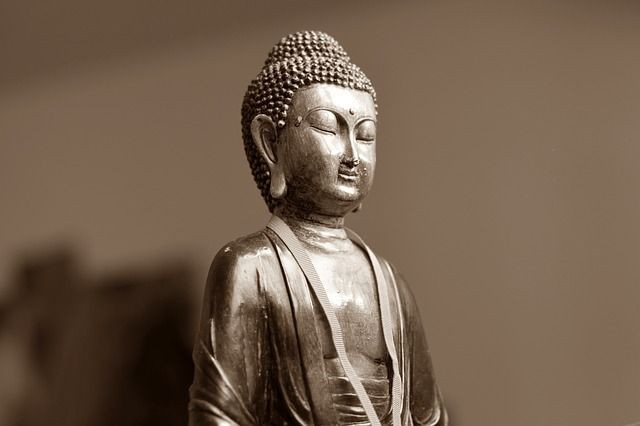Natural Anxiety Relief In 10 Minutes Or Less: Mindfulness Meditation Helps Eliminate Repetitive Thoughts

We have all experienced some form of anxiety in our lives, whether we're anxious about a job interview or going on a first date. Yet, for people with an anxiety disorder, this feeling leads to distress and meddles with their ability to live their life. Now, researchers at the University of Waterloo in Ontario, Canada suggest just 10 minutes of practicing mindfulness meditation can reduce repetitive thoughts and mind wandering in anxious people.
"We also found that meditation practice appears to help anxious people to shift their attention from their own internal worries to the present-moment external world, which enables better focus on a task at hand," said Mengran Xu, a researcher and PhD candidate at Waterloo, in a statement.
Read More: 4 Tips On How To Deal With Anxiety Without Medication
Mindfulness is a type of meditation that yields protective effects on anxious individuals. It’s defined as "paying attention on purpose, in the present moment, and without judgement," according to the researchers. Previous research indicates this technique is a promising antidote for the wandering mind, prompting Xu and his colleagues to to study its impact on a group of highly anxious people.
In the new study, published in Consciousness and Cognition, a total of 82 undergraduate students with anxiety were asked to complete a computer task while experiencing interruptions to gauge the likelihood of mind wandering. We all engage in mind wandering, but for people with anxiety, this can negatively affect their ability to learn, to complete tasks, or even function safely. The participants were placed into two groups: the control group was given an audio story to listen to, and the other group was asked to engage in a short meditation exercise before being reassessed.
The findings revealed mindfulness training has a protective effect on mind wandering in people with anxiety. Meditation helped to prevent mind wandering increasing over time, and reduced the disruption during "off-task" episodes. Moreover, meditation helped to change the focus from the internal to present-moment external world; a technique that can prove to be helpful in anxiety treatment.
"It would be interesting to see what the impacts would be if mindful meditation was practiced by anxious populations more widely" said Xu.
Previous research also supports this finding; eight weeks of meditation can significantly change the stress response in people with anxiety via stress levels and inflammatory markers. Mindfulness meditation is relatively inexpensive and considered a low-stigma treatment that improves resilience to stress. Although stress can be at the root of severe anxiety, meditation can address and treat this anxiety.
Anxiety can manifest itself both physically and emotionally in the body. This can leave us feeling exhausted and desperate for anxiety relief. Aside from mindfulness meditation, there are other techniques that can help reduce repetitive thoughts and mind wandering in just 10 minutes or less, from chewing gum to listening to music.
Read More: 4 Ways To Reduce Anxiety Symptoms And Improve Coping Skills
Chew Gum
Chewing on a piece of gum may help reduce anxiety and reduce our stress levels almost immediately, but with long-term effects. For example, a 2011 study found people who chewed gum twice a day for 14 days, were more likely to rate their anxiety as significantly less than their counterparts. Moreover, other researchers found chewing gum while completing memory-related tasks led to quicker reaction times and more focus. Anxious people struggle with repetitive thoughts, but chewing gum could act as a buffer to these behaviors.
Drink Tea
Drinking herbal tea, specifically kava tea, has been shown to affect brain chemistry in the same way as anti-anxiety drugs. The tea, derived from kava root, has been touted for helping anxious people relax and release their fears. A 2013 study found it could be as effective as current drug treatments, without the risk of dependency and a lessened likelihood for side effects.
Watch A Viral Video
Laughing is a great way to relax and let go of any anxious thoughts in your head. A 2006 study found bouts of laughter leads to an increase in blood flow and boosts immunity. Stress hormones intertwine with anxiety, but laughing continues to decrease anxiety over time via dopamine.
Listen To Music
Sound therapy is known as a popular way to relax and drown out the world via earphones. A 2016 study found listening to the song "Weightless" led to a 65 percent reduction in anxiety, and a 35 percent reduction in usual physiological resting rates in participants who attempted to solve difficult puzzles as quickly as possible while connected to sensors. The song, created by the group Marconi Union, did so in collaboration with therapists to help slow a listener’s heart rate, reduce blood pressure, and lower levels of the stress hormone cortisol.
Source: Xu M, Purdon C, Seli P et al. Mindfulness and mind wandering: The protective effects of brief meditation in anxious individuals. Consciousness and Cognition. 2017.
See Also:
7 Subtle Signs You May Have An Anxiety Disorder
What It Means To Have An Anxiety Disorder And 7 Ways To Cope



























